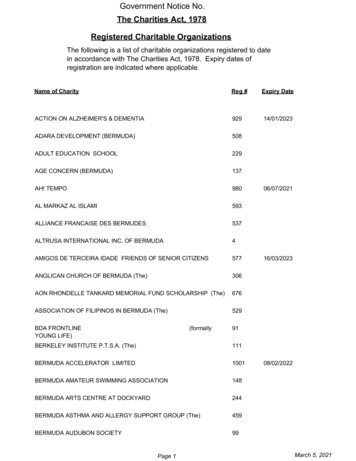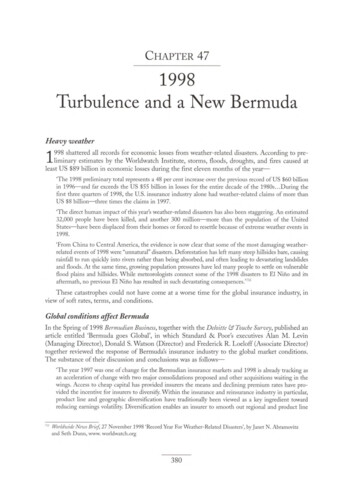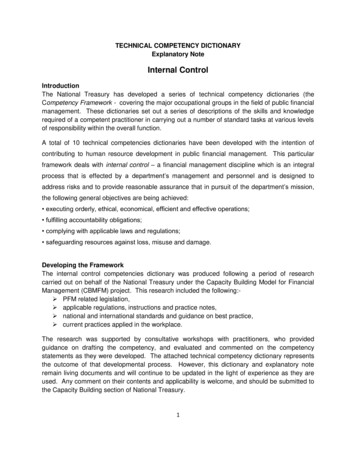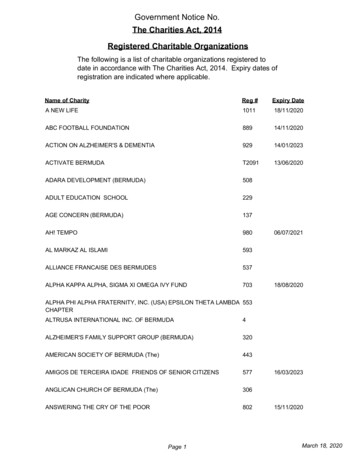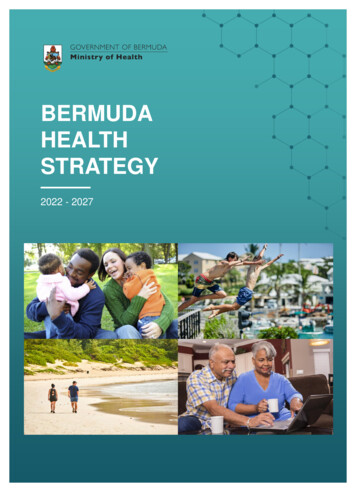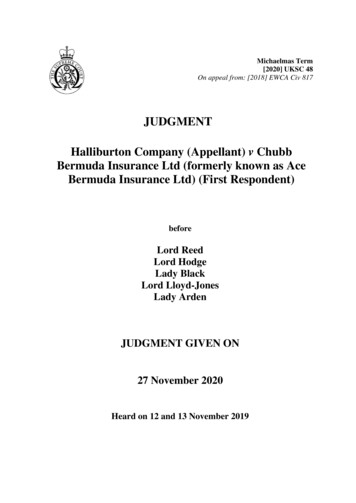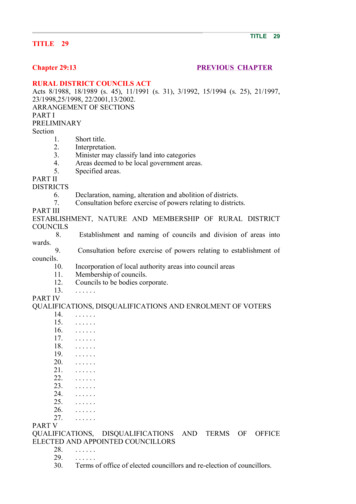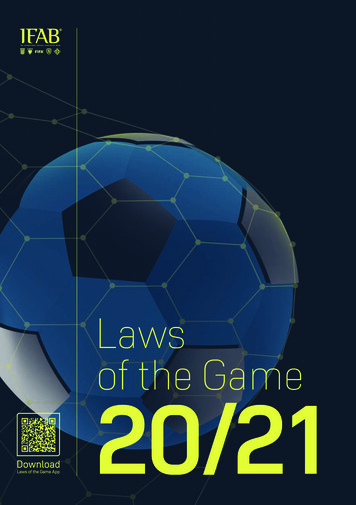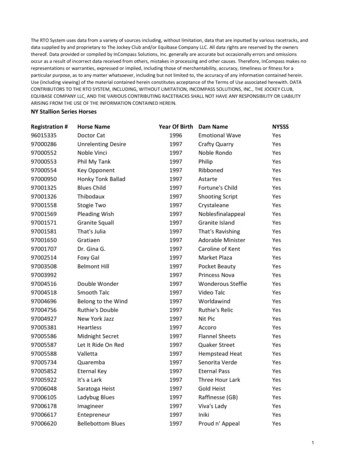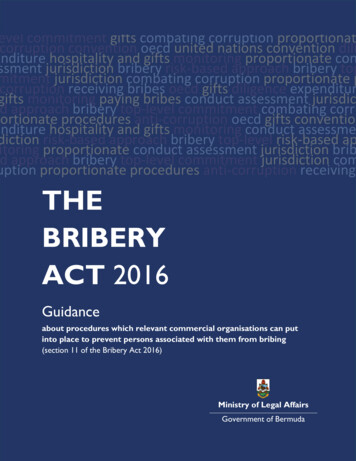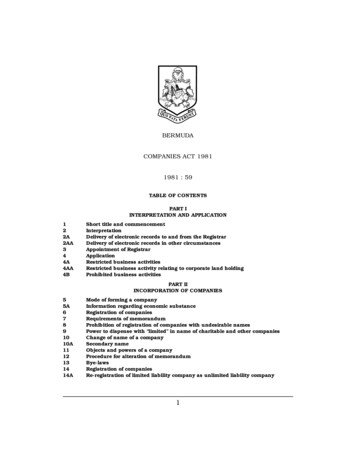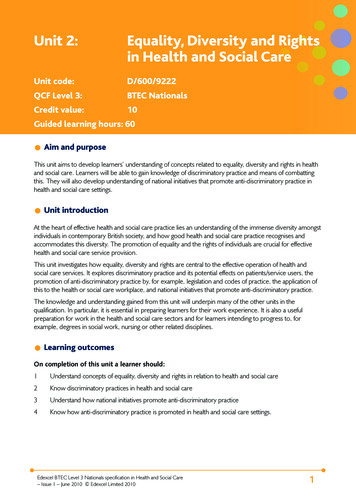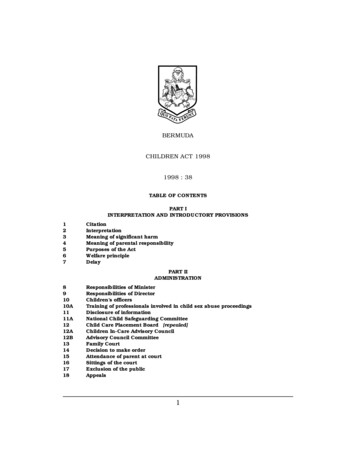
Transcription
QUOFAT A F ERUNTBERMUDACHILDREN ACT 19981998 : 38TABLE OF CONTENTSPART IINTERPRETATION AND INTRODUCTORY PROVISIONS1234567CitationInterpretationMeaning of significant harmMeaning of parental responsibilityPurposes of the ActWelfare principleDelayPART sponsibilities of MinisterResponsibilities of DirectorChildren’s officersTraining of professionals involved in child sex abuse proceedingsDisclosure of informationNational Child Safeguarding CommitteeChild Care Placement Board [repealed]Children In-Care Advisory CouncilAdvisory Council CommitteeFamily CourtDecision to make orderAttendance of parent at courtSittings of the courtExclusion of the publicAppeals1
CHILDREN ACT 1998PART IIASTATUS OF CHILDRENEQUAL STATUS OF CHILDREN18A18B18C18DAbolition of distinction between legitimate and illegitimate childrenRule of constructionApplicationPurposeESTABLISHMENT OF PARENTAGE18E18F18G18H18I18J18K18L18MDeclaration of parentageDeclaration of paternity where no presumptionReopening issue on new evidenceAdmissibility in evidence of acknowledgment against interestPresumption of paternityBlood testsRegulations for blood testsFiling of court decisions respecting parentageAmendment of registerRECOGNITION OF OVERSEAS DETERMINATION OF on of orders made outside BermudaExceptionsFiling with Registrar-GeneralFindings of parentage outside BermudaApplicationPART IIIABUSE OF CHILDREN192020A2121A2223Mistreatment, abandonment etc of childMandatory reporting of child abuseInvestigations or prosecution of sexual offences where the victim or complainantwithdraws statementChild Abuse RegisterPersons disqualified from working with childrenNotice of entry in RegisterConfidentiality of information in RegisterPART IVCARE AND SUPERVISION242526272829Court orders, relevant factorsCare and supervision ordersTimely disposal of applicationsEffect of care orderParental contact with children in careSupervision orders2
CHILDREN ACT 199830313233343536Powers of the court in family proceedingsPlan of care for childInterim ordersDischarge and variation of care orders and supervision ordersOrders pending appeals in cases about care or supervision ordersRepresentation of child and of his interests in certain proceedingsRight of litigation guardian to have access to Director’s recordsPART IVACUSTODY JURISDICTION AND DY AND ACCESS36C36D36E36F36GPersons entitled to custodyApplication for orderAssessmentPowers of courtEffect of divorce proceedings36GAPARENTINGCo-Parenting Mediation CouncilPROCEDURE36H36I36J36KApplicationEvidence of childClosed hearingsConsent ordersJURISDICTION36L36M36NJurisdictionSerious harm to childDeclining jurisdictionOVERSEAS ORDERS36O36P36Q36RInterim powers of courtEnforcement of overseas ordersSuperseding order, material change in circumstancesSuperseding order, serious harmENFORCEMENT36S36T36U36V36WOrder restraining harassmentOrder where child unlawfully withheldApplication to prevent unlawful removal of childFurther evidenceReferral to court3
CHILDREN ACT 199836X36YInformation as to addressCourt may take notice of foreign lawAPPLICATION TO CHILDREN IN CARE OF DIRECTOR36ZApplicationPART IVBSUPPORT H36.1I36.1J36.1K36.1L36.1MDefinitionsObligation of parent to support childOrder for supportPowers of courtVariation of orderFinancial statementParental agreement for supportOrder for return by employerOrder restraining harassmentApplication for custodyAdministration of paymentsEnforcementSaving of other Acts relating to support and maintenancePART VPROTECTION OF CHILDREN37383940414242A434445Child assessment ordersProtective intervention orderEmergency protection ordersDuration of emergency protection order and other supplemental provisionsPower of police officer to detain childDuty of Director to investigateOffencePowers to assist in discovery of children who may be in need of emergencyprotectionAbduction of children in care etcRecovery of abducted children etcPART VIREGISTERED CHILDREN’S HOMES46474849Registered Children’s HomesWelfare of children in children’s homeInspection etc of registered children’s homesPersons disqualified from carrying on, or being employed in, children’s homesPART VIIRESIDENTIAL HOMES5051Residential homesSecure treatment order4
CHILDREN ACT 199852Transfer from residential home to senior training schoolPART VIIIFOSTER n of foster parents and licensing of foster homesPerson prohibited from being foster parentsLimits on number of foster childrenEffect of exceeding fostering limitsComplaints etc.Insurable interestDuties of the Director to inspect foster homesDeath of a foster childCourt may order refund of considerationOffencesAppealsPART IXDAY itionsApplicationAdministrationLicenceRenewal of licenceCancellation, suspension or refusal of licenceAlteration of day care centreAdvertisingInspection and power of entryOrder for closure or to comply with decision of the Director of the Department ofHealthRecords, returns and reportsDay care providersInspection and power of entryOrder to cease providing day careRecords, returns and reportsOffencesAppealsRegulationsRevocation and transitional [omitted]PART XGENERAL8182838485Contributions ordersOrder for financial relief for persons over 18 yearsEffect and duration of ordersRemoval of child from BermudaProhibition on publication5
CHILDREN ACT 19988687888990RegulationsTransitional matters [omitted]Repeals [omitted]Consequential amendments [omitted]CommencementFIRST SCHEDULESECTION 29SUPERVISION ORDERSSECOND SCHEDULE SECTION 46THIRD SCHEDULESECTION 89CONSEQUENTIAL AMENDMENTSFOURTH SCHEDULEChildren In-Care Advisory CouncilWHEREAS it is expedient to make new provision for the care and protection of children;to provide for mandatory reporting of child abuse; to revise the law governing foster careand day care; and to make supplementary provision for those purposes:[Words of enactment omitted]PART IINTERPRETATION AND INTRODUCTORY PROVISIONSCitationThis Act may be cited as the Children Act 1998.1Interpretation2(1) In this Act, unless the context otherwise requires—“Advisory Council Committee” means the Standing Committee of the AdvisoryCouncil established under section 12B;“Board”[Repealed by 2022 : 14 s. 2]“care order” means an order under section 25 and includes an interim care ordermade under section 32;“child” means, except in Part IX, a person who is under the age of 18 years;“child assessment order” means an order made under section 37;“Children In-Care Advisory Council” and “Advisory Council” means the Councilestablished under section 12A;“children’s home” means a home which, whether or not for reward, provides careand accommodation for more than three children at any one time, but does not6
CHILDREN ACT 1998include a home in which a child is cared for by a parent, relative or person whohas parental responsibility for him;“children’s officer” means a person designated as a children’s officer under section10;“contribution order” means an order made under section 81;“court” means the Family Court and, where the context so requires, includes theMagistrates’ Court and the Supreme Court;“custody order” means an order relating to the custody of, or access to, a child;“Director” means the Director of Child and Family Services;“emergency protection order” means an order made under section 39;“family proceedings” means proceedings in relation to a child—(a) under the inherent jurisdiction of the Supreme Court;(b) under Parts II, IV, IVA or IVB of this Act;(c) under the following enactments—(i) the Matrimonial Causes Act 1974 [title 27 item 3];(ii) the Matrimonial Proceedings (Magistrates Court) Act 1974 [title 27 item5];(iii) the Adoption of Children Act 2006, or any previous enactment relatingto the adoption of children;(iv) the Domestic Violence (Protection Orders) Act 1997 [title 27 item 10];(v) Deleted;“ill-treatment” includes sexual abuse and forms of ill-treatment which are notphysical;“Minister”, except in Part IX (Day Care), means the Minister responsible for childand family services;“operate” includes to conduct, manage or maintain;“parent” includes a step-parent and a guardian;“public holiday” means a day declared to be a public holiday under the PublicHolidays Act 1947 [title 28 item 8];“record” includes a record stored by use of a computer;“registered children’s home” means a children’s home registered under section 46;“residential home” means a facility operated by the Minister or a person ororganization approved by the Minister that provides a programme of residential7
CHILDREN ACT 1998care for children of twelve years or older including assessment, treatment andsecure accommodation;“supervision order” means an order made under section 25(1)(b) and includes aninterim supervision order made under section 32;(2) In interpreting this Act the court shall give effect to the principle of genderequality and recognize that both fathers and mothers play critical roles in the developmentof children and each should have liberal access to their children notwithstanding withwhom the children live.[Section 2 subsection 1 definition “the Minister” deleted and substituted by BR 137 / 2018 order 2effective 23 November 2018; Section 2 subsection (1) definition "Board" deleted by 2022 : 14 s. 2 effective17 May 2022; Section 2 subsection (1) definitions "Children In-Care Advisory Council", "Advisory Council"and "Advisory Council Committee" inserted by 2022 : 14 s. 2 effective 17 May 2022]Meaning of significant harmFor the purpose of this Act “significant harm”, in relation to a child, means ill3treatment or impairment of health or development of a child and includes circumstanceswhere—(a) the child has suffered physical harm inflicted by a parent of the child orcaused by the failure of a parent to supervise and protect the childadequately;(b) there is a substantial risk that the child will suffer physical harm inflictedor caused as described in paragraph (a);(c) the child has been sexually abused by a parent of the child or by anotherperson where the parent of the child knows or should know of thepossibility of sexual abuse and fails to protect the child;(d) there is a substantial risk that the child will be sexually abused asdescribed in paragraph (c);(e) the child requires medical treatment to cure, prevent or alleviate physicalharm or suffering, and the child’s parent does not provide, or refuses or isunavailable or unable to consent to, services or treatment to remedy oralleviate the harm;(f) the child has suffered emotional harm demonstrated by severe anxiety,depression, withdrawal, or self-destructive or aggressive behaviour and thechild’s parent does not provide, or refuses or is unavailable or unable toconsent to, services or treatment to remedy or alleviate the harm;(g) there is a substantial risk that the child will suffer emotional harm of thekind described in paragraph (f) and the parent does not provide, or refusesor is unavailable or unable to consent to, services or treatment to remedyor alleviate the harm;(h) the child suffers from a mental, emotional or developmental condition that,if not remedied, could seriously impair the child’s development and the8
CHILDREN ACT 1998child’s parent does not provide, or refuses or is unavailable or unable toconsent to, services or treatment to remedy or alleviate the condition;(i) the child has suffered physical or emotional harm caused by being exposedto repeated domestic violence by or towards a parent of the child, and thechild’s parent fails or refuses to obtain services or treatment to remedy oralleviate the violence;(j) the child has suffered physical or emotional harm caused by chronic andserious neglect by a parent of the child, and the parent does not provide,or refuses or is unavailable or unable to consent to, services or treatmentto remedy or alleviate the harm;(k) there is a substantial risk of physical, mental or emotional harm to thechild by reason of neglect or the failure of the parent or person havingparental responsibility to provide adequate food, clothing, medicaltreatment or accommodation for the child, and a person who leaves a childof tender years unattended for an unreasonable length of time withoutmaking reasonable provision for the child’s safety and supervision shall bedeemed to have neglected the child;(l) there is substantial risk of physical, mental or emotional harm to the childby reason of substance abuse or other injurious behaviour by the parentor person having parental responsibility;(m) the child has displayed violent behaviour and threatens to become a dangerto himself or others or is otherwise beyond parental control;(n) the child has been abandoned, the child’s only parent has died or isunavailable to exercise custodial rights over the child and has not madeadequate provision for the child’s care and custody, or the child is in thecare of another person and the parent of the child refuses or is unable orunwilling to resume the child’s care and custody;(o) the child has been the victim of an offence under section 19 or an offencereferred to in sub-paragraphs (ii) to (vii) of section 55(1)(a);(p) the child is by reason of his environment or associations exposed to moraldanger; or(q) the child is pregnant and refuses or is unable to provide properly andadequately for the health and welfare needs of her child in the womb.Meaning of parental responsibility4(1) For the purpose of this Act “parental responsibility” means all the rights,duties, powers, responsibilities and authority which by law a parent of a child has in relationto the child and his property.(2) A person who—(a) does not have parental responsibility for a particular child; but9
CHILDREN ACT 1998(b) has care and control of the child,may, subject to the provisions of this Act, do what is reasonable in all the circumstances ofthe case for the purpose of safeguarding or promoting the child’s welfare.Purposes of the Act5The purposes of the Act are to—(a) protect children from harm;(b) promote the integrity of the family;(c) provide protection for the rights of children amongst persons who haveregular contact with children; and(d) ensure the welfare of children.[Section 5 repealed and replaced by 2019 : 36 s. 34 effective 1 November 2019]Welfare principleIn the administration and interpretation of this Act the welfare of the child shall be6the paramount consideration.Delay7(1) In any proceedings under Part IV (care and supervision) or Part V (protectionof children), the court shall have regard to the fact that any delay in determining anyquestion with respect to the upbringing of a child is likely to prejudice the welfare of thechild.(2) Investigations for sexual offences, and any subsequent prosecution, relating toa child should be progressed and concluded with as little delay as possible.[Section 7 amended by 2019 : 36 s. 35 effective 1 November 2019]PART IIADMINISTRATIONResponsibilities of Minister8(1) The Minister has responsibility for the general supervision of theadministration of this Act and the regulations and may give such directions as he considersnecessary in the public interest.(2) With respect to serious personal injury offences as defined under section 329Dof the Criminal Code Act 1907 where the victim or offender, or both, is a child, the Ministeris responsible for promoting and supporting the coordination between the governmentdepartments responsible for managing, protecting, preventing and reducing the saidoffences under the Criminal Code Act 1907.[Section 8 amended by 2019 : 36 s. 36 effective 1 November 2019]10
CHILDREN ACT 1998Responsibilities of Director9(1) The Director of Child and Family Services shall—(a) arrange for the investigation of any allegation or report that a child may bein need of protection, care or supervision and, where necessary, arrangefor the delivery of child care services for the benefit of the child;(aa) arrange for the delivery of physical and psychosocial assistance to achild—(i) that may be the victim of a sexual offence as defined under section329D of the Criminal Code Act 1907;(ii) who, by his conduct, has shown a failure to control his sexual impulsesand there is a likelihood of his causing injury, pain or other evil to otherpersons through failure in the future to control such impulses;(iii) who has committed a serious personal injury offence as defined insection 329D of the Criminal Code Act 1907;(ab) arrange for the investigation of any allegation or report that a child hasdemonstrated a pattern of repetitive behaviour he has failed to control andthere is a likelihood of the child causing injury, pain or other evil to otherpersons through a failure to control such impulses.(b) when a child is in the care of the Director—(i) provide accommodation for him; and(ii) maintain him,and may discharge those responsibilities by—(iii) placing him with a family member, a relative of his or a fit person onsuch terms as the Director may determine;(iv) maintaining him in a licensed foster home, a registered children’s homeor a residential home; or(v) making such other arrangements as the Director considers appropriatefor him to live with—(A) his parent;(B) a person who is not his parent but has parental responsibility forhim;(C) a person who had custody of him before the care order was made;or(D) a relative, friend or other person connected with him;(vi) arrange for the delivery of physical and psychosocial assistance for achild that may be the victim of a serious personal injury offence defined11
CHILDREN ACT 1998under section 329D of the Criminal Code Act 1907, whether or not theage of that child is required to be determined;(c) advise the Minister on matters relating to child welfare;(ca) implement a public awareness campaign to boost awareness about theharm and dangers of sexual exploitation and sexual abuse of children;(d) register children’s homes;(e) direct and supervise the inspection of the operations and records of anyfacility or other place where a child is placed.(2) The Director may delegate to a children’s officer the exercise of any functionsconferred on the Director by this Act.(3) The Director, a children’s officer or any person authorized by the Director mayappear and be heard in any court in respect of any matter arising under this Act and mayintervene in proceedings instituted by any other person.[Section 9 amended by 2019 : 36 s. 37 effective 1 November 2019]Children’s officersThe Minister may designate public officers as children’s officers.10Training of professionals involved in child sex abuse proceedingsPersons involved in a professional capacity in any respect with proceedings relating10Ato sexual offences committed against children shall participate in such educational andtraining courses designed to improve their knowledge of issues, and ability to effectivelysupport children who are victims of such offences.[Section 10A inserted by 2019 : 36 s. 38 effective 1 November 2019]Disclosure of information11(1) No children’s officer or person employed in the administration of this Act shallcommunicate or allow to be communicated information obtained in the performance of hisduties under this Act except where—(a) giving evidence in any court; or(b) authorized by the Director or the Minister.(2) Any person who contravenes subsection (1) is guilty of an offence and is liableon summary conviction to a fine not exceeding 2000.National Child Safeguarding Committee11A(1) In order to give effect to the Minister’s responsibilities under this Act, theMinister shall establish a National Child Safeguarding Committee (the “Committee”), for thepurpose of—(a) the development of a national plan of action to include makingrecommendations on effective mechanisms to enable the authorities in12
CHILDREN ACT 1998Bermuda to coordinate with each other concerning the development ofpolicies and activities with respect to combating sexual exploitation andabuse of children;(b) making policy recommendations to the Minister safeguarding and thewelfare of children;(c) coordinating activities to identify, assess and better understand Bermuda’srisks in relation to sexual abuse of children, and taking the necessary stepsto ensure that such risk assessments are kept up-to-date,(d) educating the public on, and increasing the public awareness of, the needto safeguard and promote the welfare of children;(e) providing an annual report on child safeguarding to the Minister, includingany information and recommendations requested,(f) such other functions as requested by the Minister,and the Committee shall meet as often as is necessary to carry out its duties.(2) The members of the National Child Safeguarding Committee shall be—(a) the Solicitor General;(b) the Director of Child and Family Services;(c) the Director of Court Services;(d) the Commissioner of Police,(e) the Director of Public Prosecutions;(f) the Permanent Secretary of the Ministry responsible for justice;(g) the Commissioner of Prisons;(h) the Commissioner of Education;(i) the Chief Medical Officer;(j) such other persons as the Minister may from time to time appoint.(3) The Minister may appoint a person to act as alternate to any member of theCommittee appointed under subsection (2).(4) Any Committee established under this section may regulate its ownproceedings.[Section 11A inserted by 2019 : 36 s. 39 effective 1 November 2019]Child Care Placement Board[Repealed by 2022 : 14 s. 3]12[Section 12 repealed by 2022 : 14 s. 3 effective 17 May 2022]13
CHILDREN ACT 1998Children In-Care Advisory Council12A(1) There is established a Children In-Care Advisory Council, constituted inaccordance with the Fourth Schedule.(2) The Advisory Council shall be responsible for—(a) advising the Minister on matters relating to the social development andwell-being of children in-care;(b) enquiring into, and reporting upon, any matter referred to it by theMinister;(c) informing the Minister of, and making recommendations on, mattersrelating to the social development and well-being of children in-care;(d) monitoring the progress of, and acting as an advocate for, children in-care;(e) promoting and protecting the rights of children in-care;(f) considering the effect any legislation, Government policy, programme orstandard may have on children in-care and making recommendations tothe Minister;(g) raising public awareness of, and encouraging community interest in,issues affecting children in-care.(3) The Advisory Council shall, as soon as practicable and in any case within sixmonths after the end of each year, prepare a report on the state of children in-care and onthe carrying out of its responsibilities under this Act during that year, and such report shallbe laid by the Minister before both Houses of the Legislature.(4) Fees shall be paid to members of the Advisory Council in accordance with theGovernment Authorities (Fees) Act 1971.(5) In this section and in section 12B—“children in-care” means children in respect of whom a care order has been madeunder section 25 or an interim care order has been made under section 32;“matters relating to social development and well-being” includes matters relatingto education, culture, religion, extra-curricular activities, and safety.[Section 12A inserted by 2022 : 14 s. 4 effective 17 May 2022]Advisory Council Committee12B(1) There is established a Standing Committee of the Children In-Care AdvisoryCouncil under the name “Advisory Council Committee” constituted in accordance withsubsection (2).(2) The members of the Committee shall be appointed by the Chairman of theAdvisory Council, and shall consist of—(a) the Chairman, who shall be a member of the Advisory Council; and14
CHILDREN ACT 1998(b) two other members of the Advisory Council, appointed from time to timeas the Chairman considers appropriate.(3) It shall be the responsibility of the Committee to provide for children in-carewho are capable of forming their own views to be heard on matters relating to their socialdevelopment and well-being, by way of a forum held from time to time as the Committeeconsiders appropriate.(4) A forum shall consist of not less than two Committee members and not lessthan two children in-care.(5) The Committee shall, in the performance of its responsibilities under thissection be guided by such policies and procedures that have been adopted by the AdvisoryCouncil in respect of the Committee.(6) The Committee shall submit reports to the Advisory Council on such mattersand at such times as may be specified by the Chairman of the Advisory Council.(7) Fees shall be paid to members of the Committee in accordance with theGovernment Authorities (Fees) Act 1971.[Section 12B inserted by 2022 : 14 s. 4 effective 17 May 2022]Family CourtThe jurisdiction conferred upon the court by or under this Act shall be exercised13by a Special Court established under section 12 of the Magistrates Act 1948 [title 8 item15], and a Special Court when sitting to exercise such jurisdiction shall be known as theFamily Court.Decision to make order14(1) Where the court is considering whether or not to make one or more ordersunder this Act, it shall not make an order unless it considers that doing so would betterpromote the welfare of the child than making no order at all.Attendance of parent at court15(1) Where under this Act a child is brought before the court, the parents of thechild shall attend at the court during all stages of the proceedings unless the court issatisfied that it would be unreasonable to require their attendance.(2) The court, for the purpose of enforcing the attendance of a parent, has the samepowers as a court of summary jurisdiction to enforce the attendance of witnesses.Sittings of the courtIn the exercise of the jurisdiction conferred upon it by this Act the court shall, as16far as practicable, sit in a different building or room from that in which sittings of courtsother than the Family Court are held.15
CHILDREN ACT 1998Exclusion of the publicExcept by leave of the court no person shall be present at any sitting of the court17other than the parties to the case, their counsel and other persons directly concerned inthe case.AppealsAny child or other person aggrieved by any order made under this Act may appeal18from the order to the Supreme Court in the manner and subject to the conditions providedby the Criminal Appeal Act 1952 [title 8 item 87] as though the order appealed against werean order made on a conviction by a court of summary jurisdiction.PART IIASTATUS OF CHILDRENEQUAL STATUS OF CHILDRENAbolition of distinction between legitimate and illegitimate children18A(1) Subject to subsection (2), for all purposes of the law of Bermuda a person isthe child of his natural parents and his status as their child is independent of whether heis born inside or outside marriage.(2) Where an adoption order has been made under the Adoption of Children Act2006 or any previous enactment relating to the adoption of children or the law of any otherjurisdiction, the child is in law the child of the adopting parents as if they were the naturalparents.(3) Kindred relationships shall be determined according to the relationshipsdescribed in subsection (1) or (2).(4) Any distinction between the status of a child born inside marriage and a childborn outside marriage is abolished and the relationship of parent and child and kindredrelationship flowing from that relationship shall be determined in accordance with thissection.(5) This section applies in respect of every person whether born before or after thisAct comes into force and whether born in Bermuda or not and whether or not his father ormother has ever been domiciled in Bermuda.[Section 18A inserted by 2002:36 s.3 effective 19 January 2004; subsection (2) amended by 2011 : 17s. 11(b) effective 4 November 2013]Rule of construction18B(1) Subject to subsection (3), for the purpose of construing an instrument orstatutory provision, a reference to a person or group or class of persons described in termsof relationship to another person by blood or marriage shall be construed to refer to andinclude a person who comes within the description by reason of the relationship of parentand child as determined under section 18A.16
CHILDREN ACT 1998(2) The use of the words “legitimate” or “lawful” shall not prevent the relationshipbeing determined in accordance with section 18A.(3) Section 18A shall not apply to a trust instrument made under the Trusts(Special Provisions) Act 1989 in the case where the trust instrument expressly states acontrary intention to section 18A, as provided under section 1A(2) of that Act.[Section 18B inserted by 2002 : 36 s. 3 effective 19 January 2004; Section 18B subsection (1) amendedand subsection (3) inserted by 2020 : 44 s. 3 effective 5 August 2020;]Application18CThis Part applies to—(a) any statutory provision made before, on or after the day this Part comesinto operation; and(b) any instrument made on or after the day this Part comes into operation,but does not affect—(c) any instrument made before this Part comes into operation; and(d) a disposition of property made before this Part comes into operaton.[Section 18C inserted by 2002:36 s.3 effective 19 January 2004]Purpose18DThe purpose of this Part is to ensure that the rights of a child are not affected bythe fact that his parents were not married.[Section 18D inserted by 2002:36 s.3 effective 19 January 2004]ESTABLISHMENT OF PARENTAGEDeclaration of parentage18E(1) Any person having an interest may apply to the Supreme Court (in this Partreferred to as the “court”) for a declaration that a male person is recognized in law to be thefather of a child or that a female person is the mother of a child.(2) Where
the child has suffered physical harm inflicted by a parent of the child or caused by the failure of a parent to supervise and protect the child adequately; there is a substantial risk that the child will suffer physical harm inflicted or caused as described in paragraph (a); the child has been sexually abused by a parent of the child or by another
